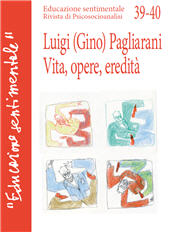Sentirsi reali : socioanalisi didattica e nuove sperimentazioni
P. 156-179
Il testo ricostruisce alcune delle prime sperimentazioni di socioanalisi "didattica", nella Milano degli anni '70, nate dall'incontro di alcuni manager e consulenti di Unilever con Gino Pagliarani. Tra questi c'era Pino Pollina che racconta anche di altre espe-rienze che hanno contribuito a costruire un modello di consulenza socioanalitica e poi psicosocioanalitica, in particolare il Laboratorio autocasi. Con Pino si era pensato di riprendere le sperimentazioni di quegli anni, aggiornando il format del Laboratorio per metterlo alla prova delle sfide di oggi. Il progetto era quasi pronto quando Pino ci ha lasciati. Prima però ha invitato Daniela Patruno a proseguire con me il progetto. Con lei abbiamo definito il format e fatto una sperimentazione con alcuni soci di Modus Srl Benefit.
Il format è stato arricchito con due brevi sessioni che raccolgono quanto è "mobilitato" dall'autocaso per esplorare meglio le connessioni intersoggettive - da un lato - e dall'altro, per individuare nuovi spunti di approfondimento teorico. Possono essere un "inquadramento prospettico" per il beneficio comune e la gloria?[Testo dell'editore].
Feeling real. Didactic socioanalysis and new experimentations. The essay traces some of early experiments of "educational" socio-analysis in Milan in Seventies, born from the encounter of few Unilever managers and consultants with Gino Pagliarani. Among them was Pino Pollina who also tells of other experiences that contributed to build a model of socio-analytical consulting, later psycho-socio-analytical, particularly the "selfcase laboratory". With Pino it was thought of thinking about resuming the experi-ments of those years, refreshing the laboratory format to test it at the proof of today's challenges. The project was almost ready when Pino left us. Before that he invited Dan-iela Patruno to continue the project with me.
With Daniela we set up the format and started an experiment with some MODUS Srl Benefit's associates. The format was en-riched with two short sessions in which to gather what is "mobilized" by the selfcase in order to better explore - on one hand - the intersubjective connections, and the other to catch new theoretical insights. Can they be a "forward-looking framework" for the common good and glory? [Publisher's Text].
Is part of
Educazione sentimentale : 39/40, 1/2, 2023-
Articles from the same issue (available individually)
-
Information
ISSN: 2037-7649
KEYWORDS
- finestra psicosocioanalitica, gruppo, laboratorio autocasi, beneficio co-mune, compito primario espanso, bellezza, gloria
- psycho-socio-analytical window, group, selfcase laboratory, common good, expanded primary task, beauty, glory


